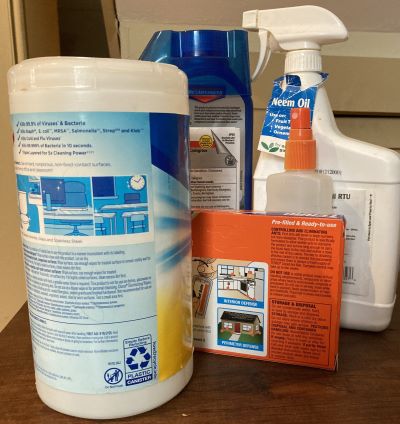
In 2021, Vermonters brought 70,000 lbs of pesticide waste from over 19,700 households to their solid waste management entities for disposal. Vermonters have a choice concerning the amount of household pesticide waste that enters the waste stream. Management includes understanding what is considered a pesticide, purchasing products only when necessary, and proper storage and use of products. Understanding all your options for managing pests can reduce the money spent by an individual on the front end, and the money spent on disposing of these products. There is the added benefit of safeguarding the environment when we use pesticides only when necessary.
What are pesticides?
All pesticide products, including natural and organic, must be registered with the Vermont Agency of Agriculture, Food and Markets. A pesticide is any substance used to kill, control, or repel a pest. Pesticide is a broad term and includes but is not limited to, specific pesticidal types like herbicides, rodenticides, insecticide, fungicides, repellents and disinfectants, such as bleach and some pool or spa chemicals. A “pest” includes insects, rodents, fungus, weeds, or virus, bacteria, or other micro-organism. Using a household product that is not intended for use to control or kill a particular pest or not as listed on a label should be avoided due to unknown toxicity or may not be effective. This often leads to waste, as well.
What are the ways to reduce homeowner pesticide use?
- Use preventative practices to dissuade pests from establishing in and around the home. Removing food sources, installing physical barriers, and creating an inhospitable environment for pests are all practices that can make a difference.
- In the home, use sanitation practices including clearing food from countertops and storing food in pest proof containers. This can reduce opportunities for pets to settle in.
- In the garden use mulch or other similar material to suppress weeds, and install pest free or resistant nursery stock or other landscape materials to reduce the need for herbicides, fungicides and insecticides.
- Properly dispose of household or yard materials that can harbor pests.
- Use mechanical pest control practices to reduce the presence of pests, such as using tools to remove nuisance plants rather than using an herbicide, or rodent traps instead of a chemical control rodenticide.
- Properly identify your pest and understand when management will be most effective. Use pesticides only as a last resort.
- Read the label before purchasing any pesticide products to ensure that it will be effective on the pest. Compare active ingredients on labels and choose the least toxic option. Labels with
- ‘Caution’ indicates lower toxicity,
- ‘Warning’ indicates moderate toxicity,
- ‘Danger’ indicates higher toxicity.
What are the ways to reduce homeowner pesticide waste?
Regardless of whether you are a homeowner or a business, the easiest way to reduce pesticidal waste is to buy only what you need for the job, and resist the urge to buy more or a larger size of the same product. Once you have used a pesticide product completely and in accordance with labels, the empty containers may be recycled. However, if you have leftover product after tackling your pest issue follow this guidance.
- Store pesticides appropriately to maintain efficacy of the product
- Keep pesticides in original containers with labels
- Take an inventory of what you have before going out and purchasing more of a product
- Always use the pesticide in accordance with label instructions
- If the product is in the original unopened container, you may be able to return to the retailer.
It is important to know what pest you are trying to control in the home or outdoors. If you can’t identify the pest, you may want to contact a pest management professional. Certified applicators receiving training or independently study to identify pests, to use pesticides safely, and to provide notice to residents regarding the use of pesticides on private property and as required in the Vermont Rule for the Control of Pesticides. Feel free to contact agr.pest@vermont.gov, for a list of pest management professionals in your area.
How do I dispose of unwanted pesticides?
The Vermont Agency of Agriculture, Food and Markets and the Agency of Natural Resources work together to ensure that Vermonters can enjoy a clean and safe environment. As part of this work the state funds disposal of pesticidal waste handled by solid waste management entities, (SWME). Please contact your local SWME for information on hazardous household waste collection events. Never throw away pesticides in the trash.
Resources
